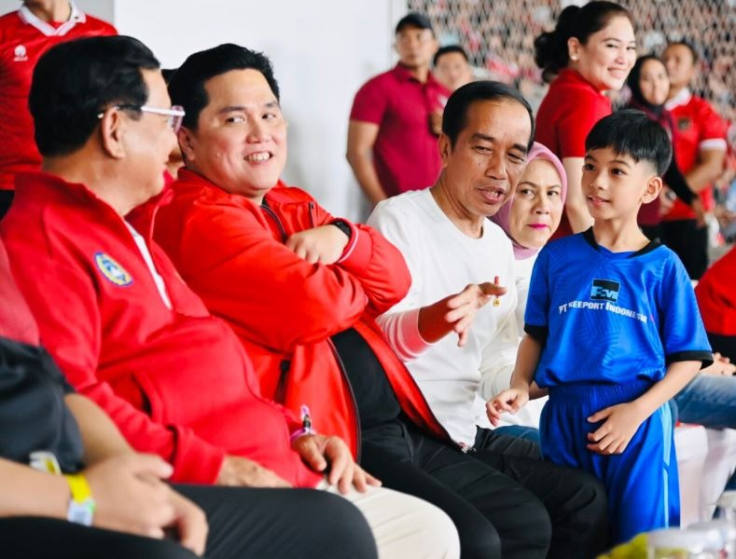Vice Presidential Picks Will Be Crucial In Indonesia's Knife-Edge Election
A year of definitive elections, 2024 will see contests in superpower states the US and India, fading power but G7 member Britain, and geopolitical focal point Taiwan.

Indonesia will also go to the polls next February in an election that is getting less media attention than the others and certainly less than it deserves.
Indeed, Indonesia's location, size, and long-term non-aligned status underline its centrality in the context of US-China tensions and the decoupling of East and West more broadly.
The archipelago may not have the economic heft of China nor the cultural capital of India but represents Southeast Asia's largest nation with a population of 280 million.
Moreover, the Indonesian economy has bucked recession and is accelerating towards high income status. Strategic investments in naval and air power also indicate formidable military potential.
And yet while Indonesia's economic and international standing is undergoing a transformation, the 2024 election ostensibly promises more of the same.
President Joko Widodo, known as 'Jokowi', will complete his second term next year after a decade in power. A relentless focus on infrastructure development, resource nationalism, and public welfare programmes were rewarded with reelection in 2014 and heady approval ratings of 75%+ to this day.
Such is the President's popularity that any candidate promising change in 2024 will surely be tempting fate.
Indeed, the two frontrunners to replace Jokowi, Defence Minister and leader of the Gerindra party Prabowo Subianto and Central Java Governor and member of the ruling PDI-P Ganjar Pranowo, have both pledged allegiance to his policies and regularly remind voters of their close rapport with the President.
The former-Governor of Jakarta Anies Baswedan, the expected third candidate, has pitched himself as an anti-government figure, a reactionary conservative in contrast to Jokowi's one-nation secularism.
As predicted, this stance has not been rewarded in the polls.
The latest national survey from IPSOS, a pollster, puts Gerindra's Prabowo on 37% and PDI-P's Ganjar on 34% in a simulation of the first round of voting. The oppositional Baswedan sits a distant third by eight points.
While Baswedan retains a good chance of making it onto the ticket for the first round, he will likely go no further, resulting in a Prabowo-Ganjar shootout with both claiming the mantle of heir to Jokowi.
The two favourites must now build out and maintain prospective party political coalitions, led by Gerindra and PDI-P respectively, but just as importantly select running mates that can complement and augment their own personal candidacies.
In terms of the polls, IPSOS puts State Owned Enterprises Minister Erick Thohir as the public's preferred vice president for both Prabowo and Ganjar, with Tourism Minister Sandiaga Uno seen as next best for the Prabowo ticket. Ridwan Kamil trails Thohir as the top pick for Ganjar's running mate.
Lagging the experienced Prabowo in the presidential race, there is a strong sense amongst domestic political strategists that Ganjar needs to get his selection exactly right.
The Governor's charisma and political antennae are beyond doubt, but he is limited as a regional leader, a reality which both precludes campaigning on a national track record and even hinders his ability to campaign nationally.
Erick Thohir, the aforementioned SOEs Minister and former owner of soccer giant Inter Milan, looks to be a shrewd (and popular) choice to cover both fronts.
In post since 2019, Thohir is noted to have generated record dividends from Indonesia's SOEs, money which the government has ploughed into popular healthcare programmes and food subsidies.
His second job as President of the Indonesia football association (PSSI) has likewise been a source of popularity. Thohir has secured Indonesia host status for this year's FIFA U-17 World Cup and is currently touring the country visiting stadiums and scouting for young footballing talent.
West Java Governor Ridwan Kamil is another figure touted for the Ganjar ticket. Kamil is noted for social media savvy and his more recent (and somewhat transparent) flattery of the PDI-P by building a statue of Soekarno, Indonesia's first President and Megawati's father, in Bandung, the provincial capital.
Regarding Prabowo Subianto's choice of running mate, the polls point to either Thohir or Tourism Minister Sandiaga Uno, who ran with Prabowo in their unsuccessful 2019 bid.
Both would bring youth and international business experience to the veteran, ex-military Defence Minister, while their present status as cabinet members would ensure continuity with, and give a nod to, the Jokowi legacy.
That said, Uno left Prabowo's Gerindra party this year to join the United Development Party (PPP). This departure to a pro-PDIP party has understandably caused disquiet in the Prabowo camp.
Despite the complexity of the political picture – epitomized by the Gerindra-Sandiaga Uno debacle - there is a slim chance that Indonesia fundamentally changes course in the immediate post-Jokowi era.
Rather, though Ganjar and Prabowo are fundamentally different characters, their topline approach would be more of the same, ideally having secured a vice president that can keep the economy on the up and navigate Indonesia's transition from a regional to an international power.





















